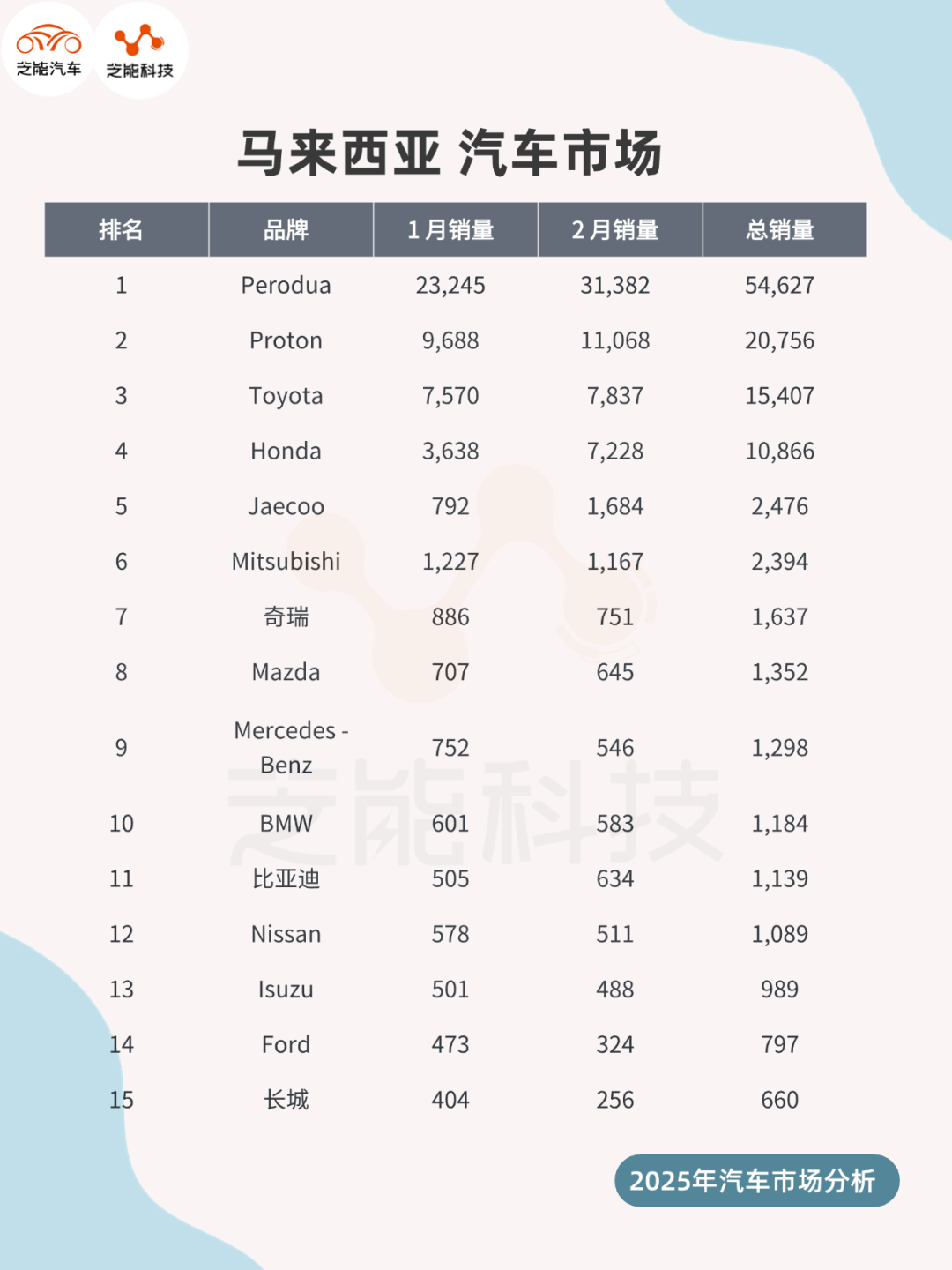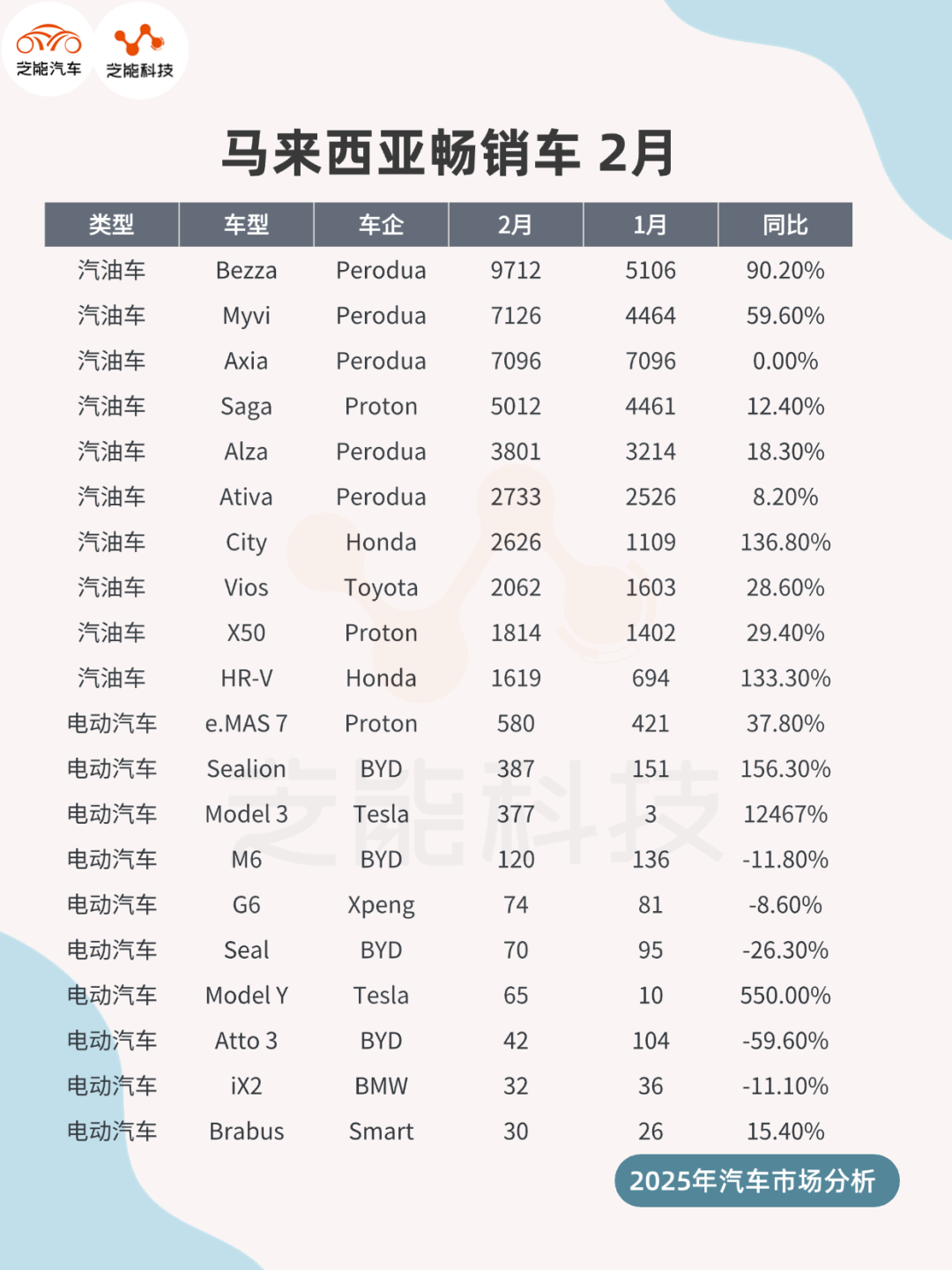Asian Auto Market | Malaysia February 2025: Chinese Brands Record Notable Growth
![]() 03/26 2025
03/26 2025
![]() 758
758

Data sourced from the Malaysian Automotive Association (MAA) and Government Transparency Initiatives
● In February 2025, Malaysia's new car sales totaled 63,906 units, down 2% year-on-year but up 31% from January's 48,732 units.
● For the first two months of 2025, overall sales declined by over 14% to 113,056 units, marking an adjustment period following the record high of 816,747 units achieved in 2024.
Gasoline cars remain dominant with a 27.1% sales surge, while electric vehicles (BEVs) saw a 58% increase. Perodua, Proton, and Toyota retain their market leadership, with Chinese brands such as BYD and Xpeng making significant inroads in the electric vehicle segment.
01
Sales Overview
In February 2025, Malaysia registered 63,906 new cars, a 2% decrease from the 65,017 units sold in the same period last year. Compared to January, which was affected by the Lunar New Year holiday (48,732 units), the market experienced a 31% month-on-month growth. Cumulative sales for the first two months stood at 113,056 units, down over 14% from the 131,938 units sold in the same period last year.
● Performance by Powertrain Type
◎ Gasoline Cars: Sales in February reached 59,868 units, an increase of 27.1% from January's 47,093 units, accounting for nearly 90% of total registrations. While cumulative sales for the first two months were not explicitly stated, their dominant position is undeniable.
◎ Diesel Cars: February registrations totaled 3,187 units, up 10% from January's 2,897 units, with a limited market share.
◎ Hybrid Cars: Sales of hybrid gasoline cars declined slightly, with 2,112 units sold in February, down 6.1% from January's 2,249 units.
◎ Electric Vehicles: Electric vehicles performed impressively, with 2,160 units registered in February, an increase of 27.7% from January's 1,691 units. Cumulative sales for the first two months reached 3,851 units.
Passenger car sales fell 12% to 105,934 units in the first two months, while commercial vehicle sales plummeted 35% to 7,122 units, indicating weak commercial demand.

● In terms of brand sales
◎ Perodua topped the list with a cumulative total of 54,627 units for January and February, selling over 30,000 units in February alone, demonstrating robust market dominance.
◎ Proton also performed well, with total sales of 20,756 units, ranking second.
◎ Toyota and Honda occupied the third and fourth positions with total sales of 15,407 units and 10,866 units, respectively.
◎ Notably, Chinese brands recorded significant gains. Jaecoo entered the top five with a substantial increase in February sales.
◎ Chery's total sales for January and February were 1,637 units.
◎ BYD also showed steady growth, with total sales reaching 1,139 units.
◎ Mercedes-Benz and BMW led in luxury sales with 1,298 units and 1,184 units, respectively.
◎ Tesla experienced a sales turnaround in February, surging from 13 units in January to 443 units, with a total sales of 456 units for January and February.
● Analysis of Chinese Brand Sales
◎ Chery Group stood out, with Chery registering 886 units in January and 751 units in February, for a total sales of 1,637 units for the first two months.
◎ Jaecoo saw strong growth in February, with 1,684 units registered, driving its total sales for January and February to 2,476 units, ranking fifth overall and showing robust growth momentum.
◎ BYD cannot be overlooked. Although it ranked 11th in overall car sales with 1,139 units for January and February, it achieved remarkable results in the electric vehicle segment.
Its Sealion 7 was the second most registered electric vehicle for January and February with 538 units, including 151 units in January and 387 units in February.
02
Sales and Competitive Landscape Analysis by Model

● Gasoline Car Market:
◎ Perodua Bezza: Sold 9,712 units in February, a 90.2% month-on-month increase, making it the best-selling model.
◎ Perodua Myvi: Sold 7,126 units in February, a 59.6% month-on-month increase, maintaining its leading position.
◎ Perodua Axia: Accumulated sales of 7,096 units for the first two months, showing stable performance.
◎ Proton Saga: Sales increased by 12.4% to approximately 5,000 units (estimated) in February, remaining Proton's pillar model.
◎ Perodua Alza: Sales increased by 18.3% to approximately 3,800 units (estimated) in February.
● Diesel Car Market:
◎ Toyota Hilux: Sold 1,677 units in February, a 29.6% month-on-month increase, leading the diesel car segment.
◎ Isuzu D-Max: Sold 488 units in February, showing steady progress.
◎ Mitsubishi Triton: Sold 279 units in February, maintaining stable performance.
◎ Ford Ranger: Sales declined by 36.5% to 231 units.
● Electric Vehicle Market:
◎ Proton e.MAS7: Sold 580 units in February, a 37.8% month-on-month increase, making it the top-selling electric vehicle.
◎ BYD Sealion: Sold 387 units in February, a 156.3% month-on-month surge.
◎ Tesla Model 3: Sold 377 units in February, achieving excellent results upon launch.
● Hybrid Car Market:
◎ Toyota Corolla Cross: Sold 655 units for the first two months, leading the hybrid segment.
◎ Honda CR-V: Sales increased by 19.7%, with specific figures not detailed.
◎ Honda HR-V: Sales increased by 31%, showing excellent performance.
◎ Haval H6: Sales declined sharply by 43.6% to 194 units.
● The Malaysian automotive market presents a competitive landscape featuring both local and international brands.
◎ Perodua and Proton dominate the market with their localization advantages and price competitiveness. Perodua focuses on economical gasoline cars, while Proton enters the electric vehicle segment through the e.MAS7.
◎ Toyota, as an international brand, maintains its market share through technology and brand influence.
In the electric vehicle segment, competition is particularly fierce. Proton e.MAS7 leads with localized production and policy support, while BYD and Tesla are rapidly rising with their technology and global brand effects. BYD has demonstrated potential with its Sealion model, but other models like M6 and Xpeng G6 have performed weakly. The entry of Tesla Model 3 has further intensified competition.
◎ Perodua and Proton focus on cost-effectiveness, attracting low- to mid-end consumers.
◎ Toyota and Honda target the mid- to high-end markets.
◎ BYD and Tesla excel in the electric vehicle segment with technological innovation and brand premium.
● Policy-wise, the tax exemption for electric vehicles is about to expire, potentially triggering a short-term sales surge.
Summary
Entering an adjustment period following the record high in 2024, Malaysia's automotive market at the beginning of 2025 still sees gasoline cars as the dominant force, but electric vehicles and hybrid cars are showing significant growth momentum. Perodua, Proton, and Toyota share the market, with Chinese brand BYD emerging as a strong player in the electric vehicle segment, making the competitive landscape increasingly diversified.







